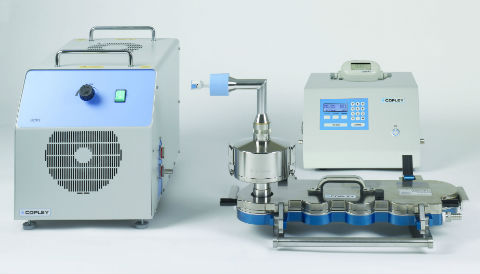New TPK 2100 Critical Flow Controller for dry powder inhaler testing

A highly automated system to speed up testing, improve reproducibility, and enhance data output and recording.
Copley Scientific will be presenting its new 3rd generation Critical Flow Controller – the TPK 2100 – for the testing of dry powder inhalers (DPIs) at the 2017 Drug Delivery to the Lungs conference (DDL2017) in Edinburgh. The company is showcasing this latest TPK model to highlight a series of new capabilities, all intended to make dry powder inhaler testing more automated, more reproducible and more efficient.
The newly introduced TPK 2100 builds on Copley’s heritage of TPK models, an international standard in the field of DPI testing equipment, and is ideally suited to the needs of formulators and quality control scientists. It sets a new benchmark for the set-up, control and documentation of all the parameters associated with the measurement of delivered dose uniformity and aerodynamic particle size distribution (APSD) by cascade impaction, in accordance with the US and European Pharmacopoeias.
Anna Sipitanou, Business Development Manager at Copley Scientific, comments: “The new TPK 2100 has already generated extremely positive feedback from customers who have interacted with it, both at RDD Europe back in April and since its launch. We think it will be a big hit at DDL, as we give live demonstrations to inhaler testing analysts and laboratory managers alike. It is rewarding to know that the advancements we have incorporated into the TPK 2100 look set to benefit both existing and new customers, making a substantial difference to productivity and efficiency in the execution of these important tests.”
Designed to replace the well-established TPK 2000, significant new features are built into the TPK 2100. A new ‘fly-by-wire’ flow control valve allows operation to be automated. Inhaler pressure drop, P1, and test flow rate are accurately and rapidly set by the TPK 2100 during test set-up, whilst in-line flow measurement can be accommodated and in-situ impactor leak testing is fully automated for the first time. The user is warned if the important P3/P2 ratio is greater than 0.5, giving full confidence that tests are conducted under sonic flow conditions, whilst notification is also given if the set flow rate and impactor leak rate are outside acceptance limits. Test duration is automatically calculated based on the required test volume, and the new model offers an optional footswitch and temperature/humidity module. Data output to printer and computer are standard, with enhanced monitoring and 5 different reports covering critical in-test parameters, whilst remote control via USB allows the TPK 2100 to be integrated into larger automated systems, where required. Finally, the new instrument allows users to emulate the previous generations of TPK, promoting interchangeability and integration into existing standard operating procedures (SOPs).
A new TPK 2100-R is also being launched. This is a reversed version where the flow inlet and outlets are swapped over to allow for different arrangements of testing equipment to be set up on the laboratory bench.
Related News
-
News CPHI North America 2024 – From the Floor
Welcome to Philly! CPHI North America once again graces the Philadelphia Convention Center, 7–9 May 2024. -
News Women in Pharma: Diversi‘tea’ at CPHI North America
CPHI North America will unite the pharmaceutical supply chain in Philadelphia from May 7–9, 2024 for 3 days of innovation and connections. As part of the content Agenda, our Diversity Track will bring the industry together to discuss the imperati... -
News More to celebrate at the CPHI Milan Pharma Awards 2024
The CPHI Milan Pharma Awards, which are now open for nominations until 18 May 2024, celebrate the innovators making a difference. This year, two new categories have been added to further honour the contributions of a diverse range of pharma professiona... -
News On Track at CPHI NA 2024: Sustainable Futures with Thermo Fisher Scientific
On the 7-9 May 2024 in Philadelphia, CPHI NA will be presenting an unmissable agenda, filled with content across 4 main tracks. In the following interview the Sustainable Futures Track sponsor, Thermo Fisher Scientific gives an overview of what to expe... -
News LEAP-ing into the future of pharma – the CPHI Middle East Vision
On March 6, 2024, the CPHI team hosted the Future of Pharma Forum at LEAP 2024, Saudi Arabia’s premier destination for tech leaders and innovators to meet and collaborate. -
News CPHI Middle East 2024 – What do we have to look forward to?
We’re bringing CPHI to the Middle East in December 2024. CPHI brings together the pharma community from all over the world, creating a platform for education, collaboration, and progress. -
News CPHI Pharma Awards 2023 – Packaging & Machinery Winner: Gasporox
After another year of impressive nominations for the CPHI Pharma Awards our winners were announced at CPHI Barcelona in October 2023. In this series of interviews, we speak to the people and teams behind the award-winning projects, concepts, and techno... -
News Unpacking what we learnt: Key Pharmapack takeaways with L.E.K. Consulting
After another successful Pharmapack show, we sat down with Karin von Kienlin, Senior Partner at L.E.K. Consulting, to discuss the biggest takeaways and surprises from 2 days of intense discussion and collaboration.
Position your company at the heart of the global Pharma industry with a CPHI Online membership
-
Your products and solutions visible to thousands of visitors within the largest Pharma marketplace
-
Generate high-quality, engaged leads for your business, all year round
-
Promote your business as the industry’s thought-leader by hosting your reports, brochures and videos within your profile
-
Your company’s profile boosted at all participating CPHI events
-
An easy-to-use platform with a detailed dashboard showing your leads and performance

.png)




.png)
.png)